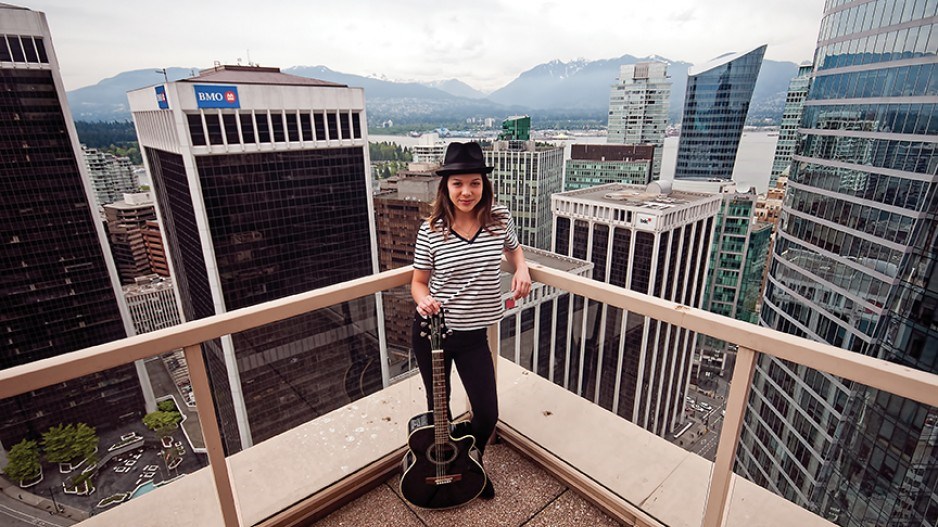With YouTube crowded by over a billion users, it can be difficult for anyone new to get noticed. That’s why Vancouver-based startup StarBeat created an alternative media platform for teenagers to showcase their talent.
Aimed at performers between 13 and 18 years old, StarBeat hosts online talent shows through its StartBeat.tv website using videos uploaded by users, typically featuring singing or dancing, though the contests are open to all forms of talent.
The site is finding an active audience in both Canada and the Philippines.
“When you have 200 million kids now with access to a free microphone, it’s even harder for true artists to cut through the noise,” said Alan Husejnagic, CEO of Talent Games, the social talent agency that owns and promotes StarBeat. “Our vision is to create entertainment that pays.”
For 14-year-old singer-songwriter Ashley Pater from Surrey, StarBeat gave her exposure she didn’t get on YouTube, she said. Singing her original song House Down the Road while playing the ukulele, she won second place and $1,000 in StarBeat’s Top Talent in Canada contest in February.
“To be able to have my music seen by so many people across a large amount of the world is amazing,” Pater said. “I was on their page a few days ago and I saw that my video was viewed over 6,000 times from all over the place, and that was amazing.”
Inspiration for the startup project partly came from a look back at the mass popularity of TV talent shows such as American Idol, Husejnagic said.
Unlike American Idol, however, StarBeat doesn’t have someone like Simon Cowell there to judge the contestants. Instead, the site uses an algorithm that measures user engagement with contest submissions through channel activity, time spent watching and ratings given, to determine a score for each video. The video that has the highest score at the end of each contest wins money from a prize pool ranging between $750 and $5,000.
Last December, a Victoria singer-songwriter in her early 20s, Kryssy Samson, took first place and $2,000 in the Top Talent in B.C. contest. Her submission to the contest was a video of her original acoustic remix of Kanye West’s Stronger and Daft Punk’s Harder, Better, Faster, Stronger.
Samson worked at a fitness centre and performed weekly at a couple of venues in Victoria, including Earls, until she heard about StarBeat from one of the gym members. The contest came to her at a time when she was planning to quit her job to pursue music. Winning it was a huge confidence boost, she said.
“It gave me more confidence in what I was doing because I think as a musician we often question ourselves if we’re doing the right thing,” said Samson. “Not only winning it felt good, but seeing all the support from my friends and family, and people I didn’t even know, for that matter – that was something big.”
The project started when Husejnagic and his partner, Steve Owst, initially invested $350,000, with an additional $300,000 raised through family and friends. Most of StarBeat is run by its investors, with six working full time and six part time.
StarBeat has not made substantial revenue yet, but Husejnagic isn’t worried – they’re in it for the long game, he said.
“Most of these early social networks are not about revenue, but about growth and market acceptance, because later on, when you make the big brand, they [the advertisers] naturally come to you.”
Lindsay Meredith, marketing professor emeritus at Simon Fraser University’s Beedie School of Business, said the company’s business model is interesting because it has identified a potentially lucrative target audience.
But it may have trouble drawing enough investment in the face of powerful competitors like YouTube, he said.
“The Achilles heel in the thing is they need money and they need it fast,” Meredith said. “Because you have to watch out for Amazon, Google, Apple, AT&T, Bell – it’s endless.”
StarBeat is partnered with GEM Advertising and is working to add partnerships with other undisclosed advertisers. After getting more investors on board, it wants to launch a $100,000 North American contest.
It may be difficult to do, Meredith said.
“It’s a chicken-and-egg problem,” he said. “To get powerful, you need to have a large platform. To get to have a large platform, you [need to] have lots of servers and lots of recognition. You need to have money to do the advertising and build that large IT network system.”




